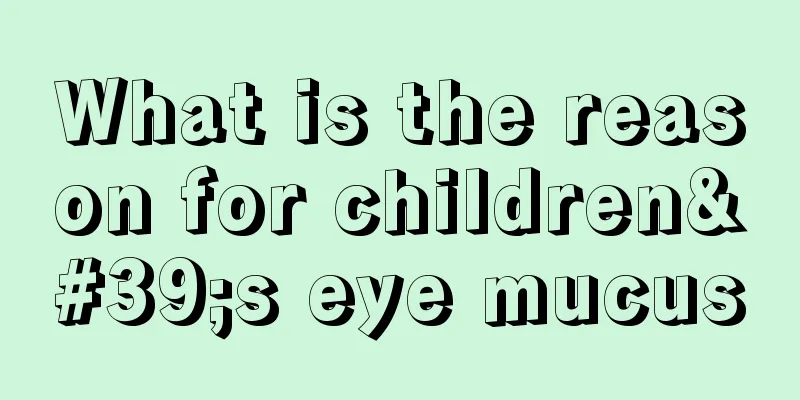What is the reason for children's eye mucus

|
Generally speaking, if the child is in good health, there will be less eye mucus when he wakes up in the early morning. If there is a lot of eye mucus, parents should be vigilant. In addition to the child's poor diet causing inflammation, it may be conjunctivitis. At this time, due to inflammation, the secretions increase, causing symptoms of excessive eye mucus. Suspected cause 1: conjunctival inflammation After the baby is born, many parents are afraid that the child will catch a cold, so the room temperature at home is often high, and bacteria are easy to multiply. In addition, the newborn will unconsciously rub his eyes with his hands, which can easily lead to symptoms of conjunctivitis such as increased eye secretions and conjunctival congestion. If it is a serious bacterial infection, or a cold and fever occurs, symptoms such as increased secretions, increased tears, and congestion of the eyes will be more obvious, and may also cause redness and swelling of the eyelid skin. Suspected cause 2: Neonatal dacryocystitis Neonatal dacryocystitis is caused by blockage of the tear duct and nasolacrimal duct that excrete tears. Because the embryonic residual membrane at the lower end of the nasolacrimal duct has not degenerated, it blocks the lower end of the nasolacrimal duct, and tears and bacteria accumulate in the lacrimal sac under the skin at the inner corner of the eye, causing secondary infection. About 2% to 4% of full-term newborns have this residual membrane, most of which will shrink on their own within 4 to 6 weeks. Suspected cause three: gonococcal pyophthalmia Gonococcal pyophthalmia is caused by gonococcal infection, with an incubation period of 2 to 4 days. It is often caused by mothers suffering from gonorrhea, and the newborn is infected when passing through the birth canal. Both eyes are affected at the same time, manifesting as acute purulent conjunctivitis. Usually the child's eyelids will be extremely red and swollen, almost unable to open, and a large amount of pus-like eye discharge will be produced continuously. If not treated properly, corneal ulcers may occur, leading to corneal perforation and even the risk of blindness. Suspected cause 4: Corneal ulcer Corneal ulcers can also cause babies to have a lot of eye mucus, and their consequences may be the most serious. Corneal ulcers are mostly caused by accidental collision or when the baby unconsciously rubs his eyes with his hands, foreign objects, fingers or nails damage the corresponding part of the cornea, thereby becoming infected by bacteria. Babies who live in an unclean environment and have poor resistance are susceptible to this disease. Because of the pain, children often cry, are afraid of light and shed tears, are unwilling to open their eyes, have red eyeballs, and have secretions. Most parents cannot find the lesions, and even if they find small white spots on the black pupils of their children, they rarely realize the seriousness of the matter. Suspected cause 5: Entropion This situation is relatively rare. Some babies have incompletely developed facial bones, especially those with wide and flat noses. The skin of the upper eyelid often extends down to the inner corner of the eye, covering part of the eye tissue and even part of the sclera. This causes the eyelid and eyelashes to move inward, causing friction and irritation to the eyeball, causing discomfort, and resulting in symptoms such as excessive tears and secretions. |
<<: What are the dietary principles for children with tics?
>>: Is it a disease for children to snore when sleeping?
Recommend
Why does a 5-month-old baby shake his head?
A five-month-old baby still needs care from his p...
How to treat vulvitis in little girls?
When it comes to vaginitis, people generally thin...
What to do if your child coughs and spits yellow phlegm
When children cough and have a lot of phlegm, the...
What is the recovery rate of leukomalacia? How to treat it?
White matter health problems have become more and...
Why does the child have pain around the belly button?
Pain around the belly button in children is a ver...
How to cure molluscum in children
Children are one of the main victims of molluscum...
What to do if your baby's teeth turn yellow
The development of teeth is a rough indicator of ...
How can boys grow taller?
The problem of boys being short in stature has be...
Can children have their teeth cleaned?
There are many misunderstandings about teeth clea...
The harm of persistent low-grade fever in babies
Persistent low-grade fever is quite harmful and m...
Differential diagnosis and treatment of jaundice
On average, nine out of every nine newborns will ...
Can precocious puberty be cured?
More and more children are experiencing precociou...
How to tell if it's hand, foot and mouth disease
I believe that everyone has doubts about hand, fo...
Snacks for 2 year olds
In fact, the number of snacks for two-year-old ch...
What to do if your child has tonsillitis and fever
We all know that it is common for children to get...









